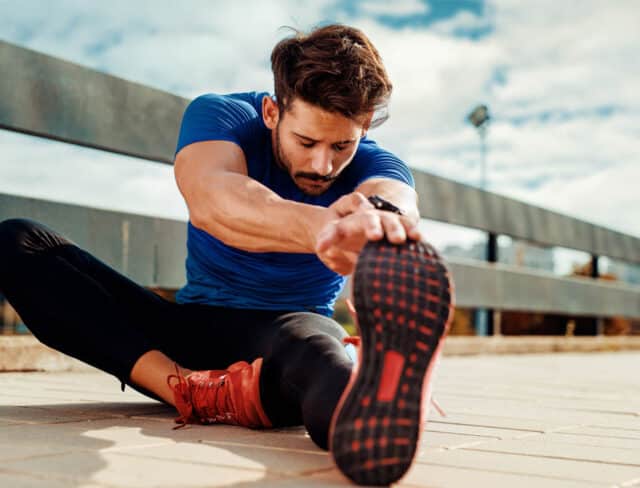written by:
reviewed by:
We all know the benefits of exercise, but nobody likes overdoing it. Here are tips to help speed up the workout recovery process.

Table of contents
Sometimes simply getting out of bed in the morning is tough. Getting yourself up and out to the gym is even harder — especially if you are still recovering from yesterday’s workout. Everybody knows the benefits of exercise, but nobody likes the way it feels when you overdo it. Here are tips to help speed up the recovery process.
1. Proper Nutrition
A balanced diet is always important, but for mild and especially more strenuous exercise, you need an ample amount of protein, vitamins, healthy fats, and carbohydrates. There is a stigma around carbs, but they are extremely important for a workout recovery and provide your body the necessary energy to operate the way it should. Carbs have also been proven to improve performance.
2. Hydration
No matter how much coffee or tea you consume, it will never compare to what water does for your body. Drink water before, during, and after your workout to avoid dehydration and a poor workout. If you struggle with drinking enough water, add flavored electrolyte packets to your water and kill two birds with one stone.
3. Post-Workout Protein
Whether you are trying to build muscle or lose weight, proteins are essential for recovery. Take a small protein bar or a shake with you to the gym or prepare a balanced carb and protein meal to reward yourself. Your favorite butcher cuts may be your go-to, but be sure to explore other ways to enjoy protein as well.
4. Supplements
Supplements are an underrated post-recovery tool. We talked about the importance of proteins, but natural supplements will spark a change in how you feel after a workout. Look for supplements with Turmeric and tart cherry to help with inflammation and Magnesium to help muscle relaxation and sleep. Supplements come in many forms, and there are plenty of tasty ways to consume the essential nutrients you need to speed your workout recover. For example, here’s a great recipe for a hardcore antioxidant smoothie.
5. Active Recovery
Active recovery, or active rest, is one of the best ways to speed recovery — instead of taking a day of rest between workouts, with active recovery you stay active. On days off, engage in activities that are less strenuous than your regular workout. Similar to any “wind down” after exercise, the idea is to increase blood flow to your muscles and remove toxins that build up during exercise. Taking a walk is the easiest option but consider swimming or yoga to let your blood flow while remaining mobile. Gentle stretching can also help with muscle soreness.
6. Avoid Overtraining
Getting into a new workout regimen can be difficult. Knowing how much you can push your body and when to stop is important. Give yourself ample time to recover between exercises. If you overdo it, you will likely exhaust yourself and your performance won’t be what you were hoping for.
7. Massage
Consider visiting a massage therapist or ask your partner to help you out! Massage is a great way to loosen up your body after a workout — it releases muscle tension, helps reduce injury and improves overall flexibility. Massages are great anytime, but for the maximum benefit, get one within an hour of your workout.
8. Sleep
This may sound like a broken record, but seven to nine hours of sleep goes a long way. When you sleep your body releases growth hormones to help facilitate muscle repair, growth, and sustainability. If you struggle to sleep, consider natural approaches to help speed your overall recovery.
9. Invest in Yourself
Off script, taking time for yourself is the most important thing for your mental health. Working out is one of the best ways to invest in yourself, no matter how fast or slow you go.
Whatever you do, keep in mind that recovery is an essential part of your fitness journey. Establishing a workout plan is the fun part, but what you do afterward is the key.
The information provided on Health Food Radar is intended for general informational purposes only. While we strive to offer accurate and up-to-date content, we do not provide medical advice, diagnosis, or treatment. Always consult with a qualified healthcare professional before making any dietary or lifestyle changes, especially if you have underlying health conditions or concerns.



